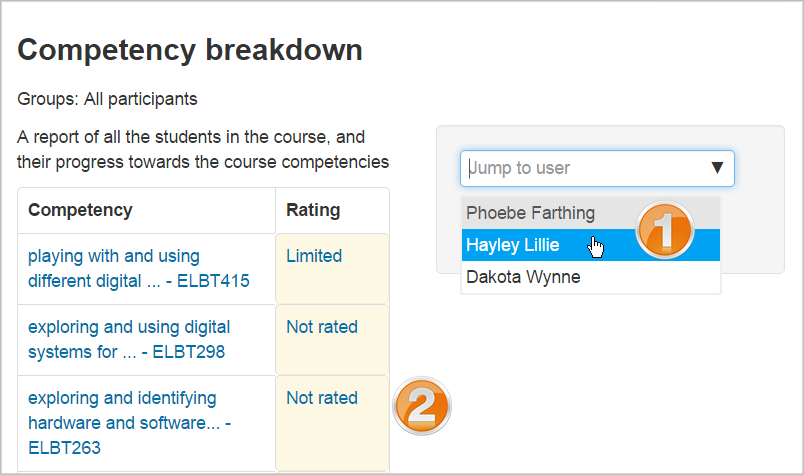Last Friday, I attended a meeting in Canberra discussing how new features
in Moodle and Mahara might be used for assessing the competencies of
university students. As discussed in the previous post, Mahara SmartEvidence seems to be more suited to the reflective
development of higher-order skills, while Moodle Competencies may be
useful for low level skills.
Competencies were introduced in Moodle Version 3.1, 23 May 2016. As with Mahara SmartEvidence, Moodle Competencies allows a "framework" to be used to manage the assessment of a student against a large number of "competencies". As with Mahara only administrators can set up the frameworks in Moodle, not teachers. Unlike Mahara, Moodle has the concept of a "Learning plan", which can be designed and then applied to one student or a group of students. Teachers can also add competencies to whole and activities within courses activities.
What is unclear to me, at this stage, is the relationship between competences, learning plans, courses and frameworks. In particular what is a "learning plan": is it a collection, or sequence, of tasks with associated competencies? Is this the VET equivalent of a course?
Moodle is a course orientated system, but competencies will typically be at a finer level of detail, with perhaps six to twenty-four competencies per course (and hundreds for a program). Also students may only need a few of the competences from each course.
One interesting point is that students can also (if authorized) add evidence of prior learning, to provide evidence of competency. This practice is common in the Australian VET sector called "Recognition of Prior Learning" (RPL), but has not been so popular at universities. However, with the demand for university graduates to have more vocationally relevant skills, RPL is finding favor.
The competency tool might be used for Work Integrated Learning (WIL), where the student receives credit for practical work during their studies. However, with RPL and WIL, there is the problem of how this is assessed and verified. It is hard enough checking that a student really did a task at the institution, let alone one undertaken elsewhere.
There is provision in Moodle for manually assessing competencies, which is similar to the process for process in Mahara SmartEvidence. One difference is that students in Moodle can be rated on a scale (so they are more than competent), rather than just partly or completely competent in Mahara.
In Mahara all the competencies are manually assessed: that is an assessor looks at the evidence the student provided on a page and decides if this partly or fully meets the requirement. In contrast, the emphasis in Moodle is on automated assessment of the competency. Typically, the student will be considered competent when they gain a specific grade in a quiz or some other form of assessment. This follows the practice used by VET, where students do many small tests.
Competencies were introduced in Moodle Version 3.1, 23 May 2016. As with Mahara SmartEvidence, Moodle Competencies allows a "framework" to be used to manage the assessment of a student against a large number of "competencies". As with Mahara only administrators can set up the frameworks in Moodle, not teachers. Unlike Mahara, Moodle has the concept of a "Learning plan", which can be designed and then applied to one student or a group of students. Teachers can also add competencies to whole and activities within courses activities.
What is unclear to me, at this stage, is the relationship between competences, learning plans, courses and frameworks. In particular what is a "learning plan": is it a collection, or sequence, of tasks with associated competencies? Is this the VET equivalent of a course?
Moodle is a course orientated system, but competencies will typically be at a finer level of detail, with perhaps six to twenty-four competencies per course (and hundreds for a program). Also students may only need a few of the competences from each course.
One interesting point is that students can also (if authorized) add evidence of prior learning, to provide evidence of competency. This practice is common in the Australian VET sector called "Recognition of Prior Learning" (RPL), but has not been so popular at universities. However, with the demand for university graduates to have more vocationally relevant skills, RPL is finding favor.
The competency tool might be used for Work Integrated Learning (WIL), where the student receives credit for practical work during their studies. However, with RPL and WIL, there is the problem of how this is assessed and verified. It is hard enough checking that a student really did a task at the institution, let alone one undertaken elsewhere.
There is provision in Moodle for manually assessing competencies, which is similar to the process for process in Mahara SmartEvidence. One difference is that students in Moodle can be rated on a scale (so they are more than competent), rather than just partly or completely competent in Mahara.
In Mahara all the competencies are manually assessed: that is an assessor looks at the evidence the student provided on a page and decides if this partly or fully meets the requirement. In contrast, the emphasis in Moodle is on automated assessment of the competency. Typically, the student will be considered competent when they gain a specific grade in a quiz or some other form of assessment. This follows the practice used by VET, where students do many small tests.

No comments:
Post a Comment